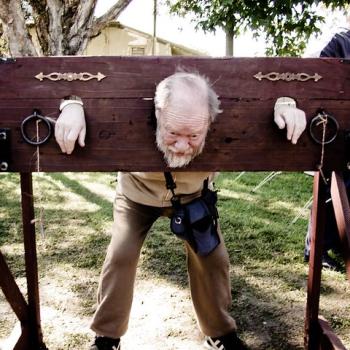In slightly less stirring fashion, the church's bean counters decided to hold pat their investment in hopes that Mr. Murdoch will divest himself of his newspapers and of his stake in the TV satellite company (and chief BBC rival) BSkyB that he is currently applying to purchase entirely. If this happens, they reason, not only will the cash-strapped Church not lose a ton of money (presumably), but the moral impetus for divesting will disappear.
So what would fill a national church—and a nation—with such disgust that it would decide it shouldn't be in any way linked to a profitable corporation?
I find several things operating. First, on a micro level, this is a human rights issue, and thus very much a Christian area of interest. All human beings are made in the image of God, and partake of certain human rights. Our founders in America spoke of these inalienable rights in terms of life, liberty, and the pursuit of happiness, and later constitutional amendments spoke of other rights as well. In Roe v. Wade, the United States Supreme Court affirmed a right to privacy in the 14th Amendment, and the United Nations has likewise said that privacy is one of our most important human rights, especially in the digital age.
We accept some violations of our privacy in exchange for security, or the promise of it. Here in Britain, for example, citizens are watched by closed circuit TV to a degree Americans would find positively creepy, while American civil rights activists continue to be creeped out by the provisions of the PATRIOT Act which permit legal surveillance of our phones and other means of communication. But the actions taken by these News of the World reporters who hacked phones in search of a story clearly violated the privacy of all those affected. It is, simply, unethical, immoral, and wrong.
A second manifestation of the human rights concern may be found on the macro level of the story, and has to do with the incredible power wielded by Mr. Murdoch and his papers over democratic societies. In a full page editorial in Sunday's Observer, the paper called for "Murdoch's malign influence to die with the News of the World." This editorial argues—and other papers likewise are saying—that for decades, Mr. Murdoch's inordinate influence on politics, in business, and in the media has tainted everything it touched. Marina Hyde, in last Friday's Guardian, called Mr. Murdoch "Britain's most obscenely powerful unelected foreign tax exile," and the consensus is that the concentration of so much media power in the hands of one person is a bad thing.
This is not, theologically or ethically, about Mr. Murdoch's success in business, which is another issue entirely. When one person—or a handful of them—hold so much power that their voices matter more than hundreds, thousands, or millions of other voices, then again, the right of each individual to be heard, respected, and cared for can be and often is overrun. Mr. Murdoch is the most powerful media figure in Britain, as he is, perhaps, in the States, Australia, and other countries as well; as the Christian Science Monitor notes, News Corp is second only to the Walt Disney corporation in global revenue. This scandal comes at a time when he is angling to control more of the media while arguing against the "tyranny" of the BBC, which provides, in this writer's opinion, some of the best news coverage and entertainment programming on the planet.
In a press conference on the matter, Prime Minister David Cameron spoke the other day about "a black cloud hovering over press, parliament, and police," a cozy relationship between press and politicians that has to change. Perhaps this is Mister Cameron's Nixon goes to China moment, for the Prime Minister has been, like many British politicians, a frequenter of Murdock parties, and he is, moreover, a close friend to Rebekah Brooks, former newspaper editor, and now head of Murdoch's News International in Britain. Over Christmas, he was a guest in her home.
I know it is a fallen world, but citizens nonetheless expect their governments to operate ethically, legally, and without undue influence. But in Britain it appears as though employees and executives of News International have suborned the justice system, and Parliament and Prime Ministers have been forced to constantly check their media rear view mirrors for Mr. Murdoch. Pro-business policies that directly benefited Mr. Murdoch and his holdings—even as they were detrimental to others, maybe even to a vast majority of Britons—have been advanced decade by decade, and many disturbing questions about this influence on government linger.





